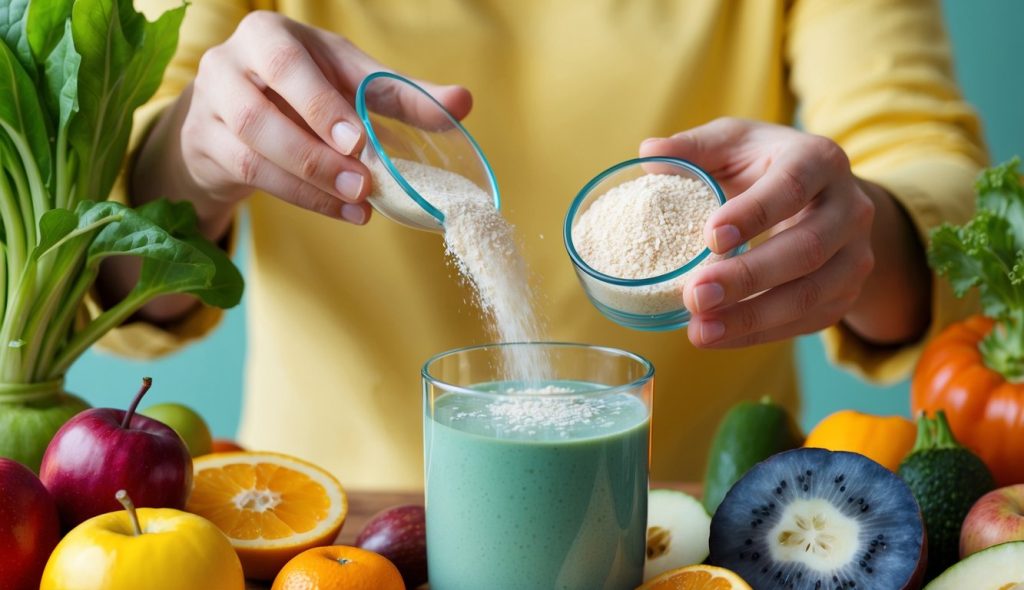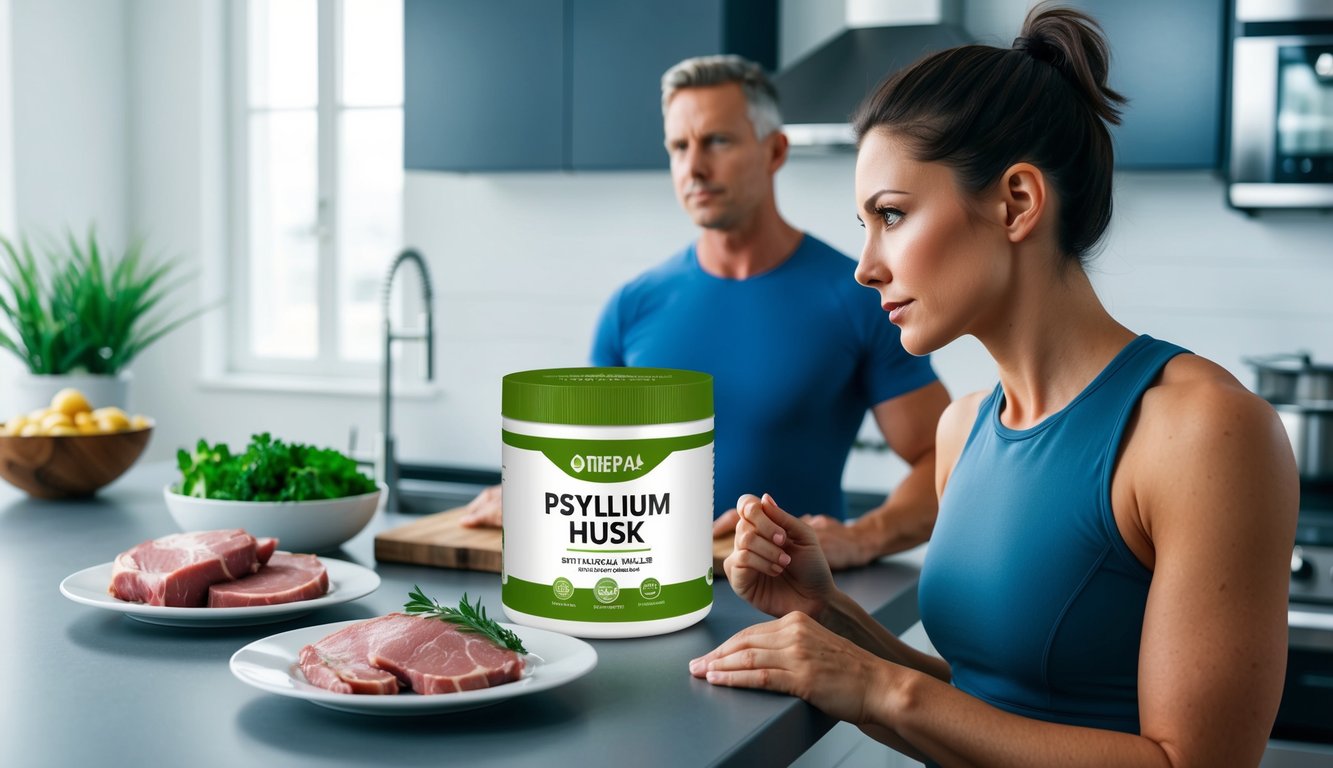Psyllium husk has gained attention among carnivore diet enthusiasts as a potential source of fiber. While the carnivore diet typically excludes plant-based foods, some practitioners consider adding this supplement to support digestive health. Psyllium husk is a soluble fiber derived from the seeds of the Plantago ovata plant that forms a gel-like substance when mixed with water, potentially aiding digestion and promoting regular bowel movements.
The carnivore diet, which consists exclusively of animal products, naturally lacks fiber. This absence has led some followers to explore options like psyllium husk to address potential digestive concerns. However, opinions on incorporating psyllium husk into a carnivore diet remain divided. Some argue that it contradicts the core principles of the diet, while others view it as a helpful addition for those experiencing digestive issues.
Proponents of adding psyllium husk to a carnivore diet suggest it may help regulate digestion and improve overall gut health. Critics, on the other hand, maintain that the carnivore diet should remain free of plant-based supplements. The debate surrounding psyllium husk in the context of a carnivore diet highlights the ongoing discussions about optimal nutrition and the potential benefits or drawbacks of dietary fiber in various eating approaches.
Understanding Psyllium Husk
Psyllium husk is a versatile and beneficial dietary supplement derived from the Plantago ovata plant. It offers numerous health advantages and has various applications in food and supplementation.
Composition of Psyllium Husk
Psyllium husk consists primarily of soluble fiber. When mixed with water, it forms a gel-like substance that expands in the digestive tract. This unique property makes it effective for promoting regularity and supporting digestive health.
Psyllium husk is also a prebiotic, which means it feeds beneficial gut bacteria. This helps maintain a healthy gut microbiome.
The husk is gluten-free, making it suitable for those with celiac disease or gluten sensitivities.
Health Benefits of Psyllium
Psyllium husk offers several health benefits:
- Promotes digestive regularity
- Supports heart health by helping lower cholesterol levels
- Aids in blood sugar management
- Assists with weight management by promoting feelings of fullness
It may also help alleviate symptoms of irritable bowel syndrome and provide relief from hemorrhoids.
Regular consumption of psyllium husk can contribute to improved overall digestive health and function.
Common Uses in Food and Supplements
Psyllium husk is widely used in both food products and dietary supplements:
- Baking: It serves as a gluten-free binding agent in baked goods
- Thickener: Acts as a natural thickener in recipes, similar to xanthan gum
- Supplements: Available in capsule or powder form for easy consumption
In food applications, whole psyllium husk can add texture and fiber to recipes. It’s often used in gluten-free baking to improve texture and moisture retention.
As a supplement, psyllium husk is commonly taken mixed with water or added to smoothies. It’s important to consume adequate fluids when taking psyllium husk to prevent digestive discomfort.
Psyllium Husk and the Carnivore Diet
Psyllium husk and fiber supplementation remain controversial topics within the carnivore diet community. Some adherents argue for their exclusion, while others consider potential benefits.
Rationale Behind Carnivore Diet Fiber Skepticism
The carnivore diet emphasizes animal products exclusively, eliminating plant-based foods and fiber sources. Proponents argue that fiber is unnecessary for optimal health and digestion.
Carnivore diet advocates point to the absence of fiber in meat and animal products as evidence that humans don’t require it. They claim that the digestive system can function efficiently without fiber intake.
Some followers report improved digestion and reduced gastrointestinal issues after eliminating fiber from their diet. This anecdotal evidence fuels skepticism towards fiber supplementation in carnivorous eating plans.
Digestive System Considerations
The human digestive system adapts to different dietary inputs over time. Carnivore dieters often experience initial changes in bowel habits as their bodies adjust to a fiber-free diet.
Proponents argue that the digestive system can maintain regularity without fiber through proper hydration and sufficient fat intake. They claim that meat provides necessary nutrients for gut health.
Critics worry about potential negative impacts on gut bacteria diversity and colon health. The long-term effects of a fiber-free diet on digestive health remain under-researched.
Potential Benefits of Fiber in a Carnivore Diet
Some carnivore dieters incorporate limited fiber sources like psyllium husk to address specific health concerns. Potential benefits include:
- Improved bowel regularity
- Reduced constipation
- Better satiety and appetite control
- Possible prebiotic effects for gut bacteria
Psyllium husk is a popular choice due to its low carbohydrate content and minimal impact on ketosis. It forms a gel-like substance in the digestive tract, potentially aiding waste movement.
Carnivore dieters experimenting with fiber supplementation often do so cautiously, monitoring their body’s response. Individual experiences vary, highlighting the importance of personalized approaches to nutrition.
Nutritional Impact of Psyllium Husk

Psyllium husk offers significant nutritional benefits, particularly in relation to blood sugar control, cholesterol management, digestive health, and weight regulation. This indigestible fiber has wide-ranging effects on the body’s metabolic processes.
Psyllium Husk’s Effects on Blood Sugar and Cholesterol
Psyllium husk can help stabilize blood sugar levels by slowing the absorption of glucose in the digestive tract. This effect is particularly beneficial for individuals with diabetes or those at risk of developing the condition. Studies have shown that regular psyllium intake may lead to improved glycemic control.
In terms of heart health, psyllium husk has demonstrated the ability to lower LDL cholesterol levels. The soluble fiber binds to bile acids in the intestines, promoting their excretion. This process forces the body to use cholesterol to produce more bile acids, effectively reducing overall cholesterol levels in the bloodstream.
Influence on Gut Health and Digestion
Psyllium husk acts as a prebiotic, promoting the growth of beneficial gut bacteria. These bacteria produce short-chain fatty acids like butyrate, which support colon health. The fiber in psyllium husk also helps regulate bowel movements, alleviating both constipation and diarrhea.
By absorbing water and forming a gel-like substance, psyllium husk adds bulk to stool, making it easier to pass. This can help reduce straining during bowel movements and alleviate symptoms of hemorrhoids. For those prone to diarrhea, psyllium’s water-absorbing properties can help firm up loose stools.
Weight Management and Satiety
Psyllium husk can be a useful tool for weight management. When consumed with water, it expands in the stomach, creating a feeling of fullness. This increased satiety can help reduce overall calorie intake and curb snacking between meals.
The indigestible fiber in psyllium husk adds bulk to the diet without contributing significant calories. This can be especially beneficial for individuals following low-carb or carnivore diets who may struggle to meet their daily fiber intake. By promoting regular bowel movements, psyllium husk may also help reduce bloating and improve overall digestive comfort.
Safe Integration of Psyllium Husk into a Meat-Based Diet
Incorporating psyllium husk into a carnivore diet requires careful consideration of dosage, potential interactions, and product quality. Proper integration can support digestive health while maintaining the principles of a meat-based eating plan.
Daily Intake Recommendations and Monitoring
Start with a small amount of psyllium husk, typically 1/2 to 1 teaspoon per day, mixed with water. Gradually increase the dosage over several weeks, not exceeding 3 tablespoons daily. Monitor bowel movements and digestive comfort closely.
Consume psyllium husk with plenty of water to prevent constipation. Aim for at least 8 ounces of water per teaspoon of psyllium. Take it between meals to avoid potential nutrient absorption issues.
For those on keto or low-carb diets, psyllium husk is a suitable supplement due to its minimal impact on blood sugar levels. It can be incorporated into recipes for gluten-free meat-based dishes as a binding agent.
Interaction with Medication and Nutrients
Psyllium husk may interact with certain medications by affecting their absorption. Take medications at least 1 hour before or 2-4 hours after consuming psyllium husk. This is particularly important for blood thinners, diabetes medications, and some antibiotics.
It can potentially lower cholesterol levels, which may be beneficial for some individuals on a meat-heavy diet. However, those taking cholesterol-lowering medications should consult their healthcare provider.
Psyllium might impact the absorption of fat-soluble vitamins (A, D, E, K) found in grass-fed beef, fish, and dairy. To mitigate this, consider taking these nutrients separately from psyllium husk supplementation.
Sourcing Quality Psyllium Husk Products
Choose organic, pure psyllium husk powder or whole husks without additives. Look for products that are third-party tested for contaminants and heavy metals. Reputable health food stores and well-known online retailers often carry high-quality options.
Store psyllium husk in an airtight container in a cool, dry place to maintain its efficacy. Check the expiration date and avoid using products past their prime.
When purchasing, compare ingredients and pricing. Some brands may offer better value for the same quality. Consider buying in bulk if you plan to use psyllium husk regularly, but ensure you can consume it before it expires.
Addressing Common Concerns

Integrating psyllium husk into a carnivore diet raises several important considerations. Proper usage and understanding can help mitigate potential issues and maximize benefits.
Side Effects and How to Minimize Them
Introducing psyllium husk may cause temporary discomfort for some individuals. Common side effects include bloating, gas, and abdominal cramps. To minimize these effects, start with a small dose and gradually increase over time.
Staying well-hydrated is crucial when consuming psyllium husk. Drink plenty of water to prevent constipation and aid in smooth digestion.
Some people may experience allergic reactions to psyllium. If symptoms like itching, swelling, or difficulty breathing occur, discontinue use immediately and consult a healthcare provider.
Handling Gastrointestinal Issues
Psyllium husk can be particularly helpful for those experiencing constipation on a carnivore diet. Its fiber content adds bulk to stools and promotes regularity.
For individuals with diarrhea, psyllium’s water-absorbing properties can help firm up loose stools. Start with small amounts to avoid exacerbating symptoms.
Those with irritable bowel syndrome (IBS) should introduce psyllium husk cautiously. While it may alleviate symptoms for some, it could worsen them for others. Consult a doctor before use.
Myths and Misconceptions
Contrary to popular belief, psyllium husk does not contain gluten. It’s safe for those with celiac disease or gluten sensitivity.
Some argue that fiber supplements are unnecessary on a carnivore diet. While true for many, individual needs vary. Psyllium can be beneficial for those struggling with digestion.
The idea that psyllium husk will disrupt ketosis is unfounded. Its minimal carbohydrate content is unlikely to affect ketone production significantly.
Psyllium is not a laxative in the traditional sense. It works by absorbing water and adding bulk to stool, promoting natural bowel movements rather than artificially stimulating them.
Aligning Psyllium Husk with Fitness and Wellness Goals

Psyllium husk offers numerous benefits that can support fitness goals and overall wellness. Its unique properties contribute to cardiovascular health, physical performance, and longevity.
Supporting Cardiovascular Function
Psyllium husk plays a crucial role in heart health and blood pressure regulation. It helps lower cholesterol levels by binding to bile acids in the digestive system, promoting their excretion. This process forces the liver to use more cholesterol to produce new bile acids, effectively reducing overall cholesterol levels.
Studies have shown that regular psyllium intake can reduce LDL (bad) cholesterol by up to 7%. Additionally, it may help lower triglycerides and increase HDL (good) cholesterol.
Psyllium’s ability to form a gel-like substance in the intestines slows down carbohydrate absorption. This property aids in blood glucose control, which is beneficial for individuals following low-carb or keto diets.
Enhancing Physical Energy and Recovery
Psyllium husk can contribute to improved physical performance and recovery. Its fiber content helps maintain stable blood sugar levels, providing sustained energy during workouts.
By promoting better digestion and nutrient absorption, psyllium supports the body’s ability to utilize nutrients effectively. This can lead to improved muscle recovery and reduced fatigue after intense exercise sessions.
Psyllium’s bulk-forming properties also help create a feeling of fullness, which can be beneficial for those aiming to manage their calorie intake for weight loss or maintenance.
Longevity and Overall Well-Being
Incorporating psyllium husk into a fitness regimen can contribute to long-term health and well-being. Its prebiotic properties support a healthy gut microbiome, which is linked to improved immune function and reduced inflammation.
Regular psyllium consumption may help lower the risk of certain chronic diseases. Its ability to regulate blood sugar levels can be particularly beneficial in preventing type 2 diabetes.
Psyllium’s role in promoting digestive health and regular bowel movements can contribute to better toxin elimination and overall bodily function. This supports the body’s natural detoxification processes, potentially reducing the workload on the liver and other vital organs.
